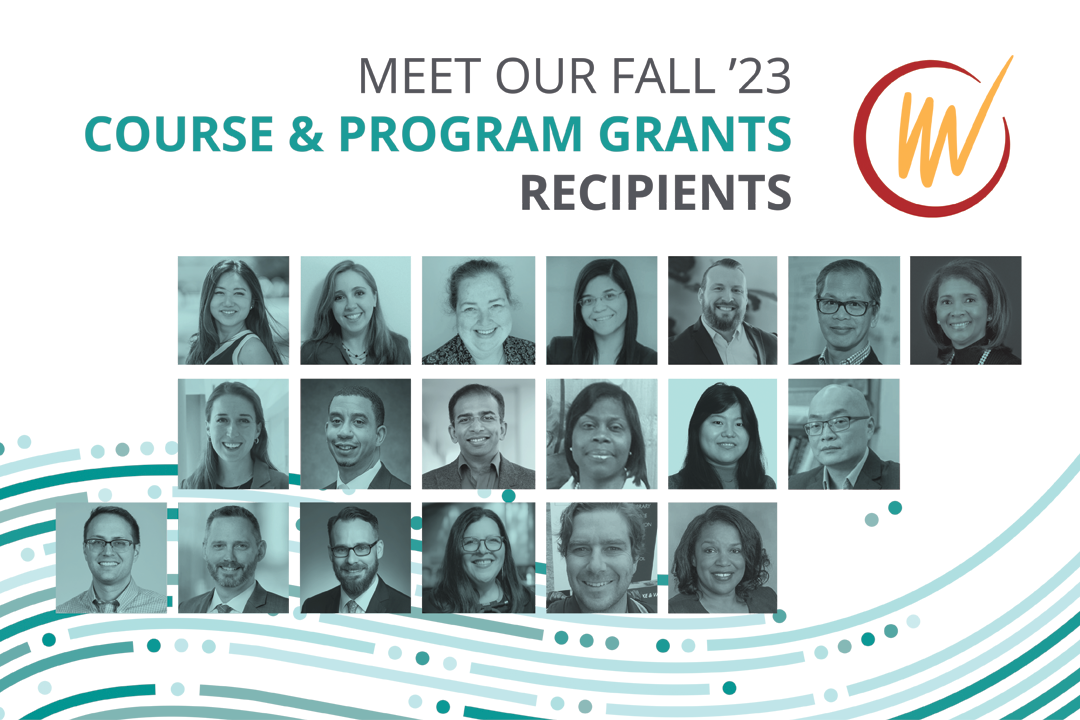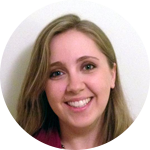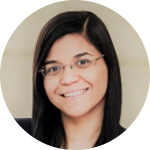
Our newest Fall 2023 Course & Program Grants recipients were awarded over $558,600 for their inspiring efforts to expand and strengthen STEM innovation and entrepreneurship (I&E) ecosystems, with the end goal of accelerating sustainable and inclusive innovation. Hailing from 19 institutions, these pioneering faculty and staff submitted winning proposals that exemplify a passion for providing student entrepreneurs with opportunities to forge deeper connections in their communities, industries, and the broader I&E ecosystem. In addition to receiving funding, grantees will convene in-person for a kickoff meeting, engage in a community of practice, and receive technical assistance to support the implementation and sustainability of their project.
“We are determined to build pathways to support innovators and faculty at institutions who traditionally do not have access to funding and programs in order to contribute their unique assets to innovation ecosystems,” said VentureWell Vice President of Innovation Ecosystems Demetria Gallagher. “This year’s cohort consists of five Historically Black Colleges and Universities (HBCUs), five Hispanic-Serving Institutions (HSIs), and three Minority-Serving Institutions (MSIs) that are eager to showcase their expertise in creating solutions to advance the I&E culture on their campuses.”
We are inspired by the efforts of our grantees, such as Raymar Dizon, associate director of the Office of Technology Transfer at Morgan State University, who is partnering with David Steele, a commercialization expert at the University of Maryland-College Park, to develop a new experiential learning program pairing graduate students with doctoral candidates from both institutions to identify and pursue commercialization opportunities.
Over at Montana State University, Professor Paul Gannon, Assistant Professor Brooke Lahneman, and Associate Professor Sweeney Windchief are enhancing an existing entry-level course to drive student-led research projects and solutions to sustainability challenges impacting indigenous cultures.
Stay tuned for a few exciting changes to our long-standing Course & Program Grants program to be announced in the near future.
Learn more about the inspiring ways in which faculty and staff are innovating to build entrepreneurial and inclusive ecosystems: venturewell.org/faculty-grantees.
Meet Our Grantees
 Certificate Program in Innovative Problem-Solving for Contemporary Issues: Empowering Change
Certificate Program in Innovative Problem-Solving for Contemporary Issues: Empowering Change
Principal Investigator: Marybeth Gasman, Rutgers University-New Brunswick
Co-Principal Investigators: Gisselle Criollo, Rutgers University-New Brunswick; Alice Ginsberg, Rutgers University-New Brunswick; Natalie Passov, Rutgers University-New Brunswick
A new certificate program provides students from MSIs with an opportunity to produce a capstone project that focuses on challenges in public health, access to new technologies, climate change, educational equity, immigration, housing, and food insecurity.
 Closing the Innovation Gap: Introducing the Master of Science in Entrepreneurship and Innovation, Technology Track
Closing the Innovation Gap: Introducing the Master of Science in Entrepreneurship and Innovation, Technology Track
Principal Investigator: Anna Long, California State University-San Bernardino
Co-Principal Investigators: Janeya Griffin, California State University-San Bernardino; Michael Stull, California State University-San Bernardino
A new technology track within the Master of Science in Entrepreneurship and Innovation program will create an intellectual property (IP) database in collaboration with HBCUs and MSIs, establish an apprenticeship-based fellowship, and add additional classes focused on application.
 Collaborative Healthcare Innovation: Designing Assistive Technology for Adults
Collaborative Healthcare Innovation: Designing Assistive Technology for Adults
Principal Investigator: Carolyn Buchanan, University of Central Florida
Co-Principal Investigators: Bari Hoffman, University of Central Florida; Joon-Hyuk Park, University of Central Florida; Jennifer Tucker, University of Central Florida
A new multidisciplinary course bridges healthcare disciplines with essential business practices, allowing students to develop assistive technology for adults through a term project that includes guest speakers, demonstrations of emerging technology, and opportunities to participate in competitions.
 A Community-Based Approach To Catalyze an Inclusive, Place-Based Innovation Ecosystem in Rural Appalachia
A Community-Based Approach To Catalyze an Inclusive, Place-Based Innovation Ecosystem in Rural Appalachia
Principal Investigator: Ashley Taylor, Virginia Polytechnic Institute and State University
Co-Principal Investigators: Christopher Arena, Virginia Polytechnic Institute and State University; Andre Muelenaer, Virginia Polytechnic Institute and State University
A new interdisciplinary program helps students to develop solutions that improve rural health equity in the Appalachian region, mobilizing faculty and partners in the local community to identify unmet needs and strengthen the innovation ecosystem on campus.
 Culturally Inclusive STEM I&E Education for Sustainability
Culturally Inclusive STEM I&E Education for Sustainability
Principal Investigator: Paul Gannon, Montana State University
Co-Principal Investigators: Brooke Lahneman, Montana State University; Sweeney Windchief, Montana State University
A new addition to an existing entry-level STEM course will foster student-driven research projects, community engagement, and solutions to sustainability challenges that impact indigenous cultures.
 Emerging Technologies Internship Program: A Catalyst for Innovation and Collaboration
Emerging Technologies Internship Program: A Catalyst for Innovation and Collaboration
Principal Investigator: Raymar Dizon, Morgan State University
Co-Principal Investigator: David Steele, University of Maryland-College Park
A new experiential learning program, the Emerging Technologies Internship, will provide graduate students and doctoral candidates from Morgan State University and the University of Maryland with the support to identify and pursue commercialization opportunities.
 Empowering Tomorrow’s Green Innovators: Launching a Sustainable Entrepreneurship Graduate Certification Program for Climate and Cleantech Pioneers
Empowering Tomorrow’s Green Innovators: Launching a Sustainable Entrepreneurship Graduate Certification Program for Climate and Cleantech Pioneers
Principal Investigator: Richard Chan, Stony Brook University
Co-Principal Investigators: Ed Fabian, Stony Brook University; Manoj Mahajan, Stony Brook University; Louis Pena, Stony Brook University
A new graduate certificate program in sustainable entrepreneurship will offer coursework including sustainable entrepreneurship, clean technology innovation and commercialization, and sustainable business practices for real-world opportunities in internships and employment.
 Excelling at Tech Transfer: An Educational Program To Advance Inclusive Innovation and Entrepreneurial Ecosystems
Excelling at Tech Transfer: An Educational Program To Advance Inclusive Innovation and Entrepreneurial Ecosystems
Principal Investigator: Maribel Guerrero, Arizona State University
Co-Principal Investigators: Maryann Feldman, Arizona State University; Donald Siegel, Arizona State University
A new certificate program connects underrepresented STEM students with entrepreneurship education, experiential learning, and opportunities to meet with industry professionals.
 Expanding Bioentrepreneurship Training and Biotechnology Industry Ecosystem Access To Underserved Populations Through an Open-Access, Multiple Campus Life Science Innovation Course
Expanding Bioentrepreneurship Training and Biotechnology Industry Ecosystem Access To Underserved Populations Through an Open-Access, Multiple Campus Life Science Innovation Course
Principal Investigator: Brian DeHaven, Philadelphia College of Osteopathic Medicine
Co-Principal Investigator: David Zuzga, Wistar Institute
A new course leverages IP developed at the Wistar Institute in order to familiarize student teams with the IP process, foster collaboration with inventor scientists, and develop business strategies for their own technology, culminating in a final pitch competition.
 Improving the Campus Innovation Ecosystem Through an Entrepreneurship Certificate and Minor for Non-Business Majors
Improving the Campus Innovation Ecosystem Through an Entrepreneurship Certificate and Minor for Non-Business Majors
Principal Investigator: Tracy Dunn, Benedict College
Co-Principal Investigator: Michele Dugar, Benedict College
A new entrepreneurship certificate and minor for non-business majors leverages coursework that connects students with the established on-campus innovation and entrepreneurship ecosystem through the lab.
 Infusion and Impact of Customer Discovery in a Nanoengineering-based STEM Entrepreneurship Course
Infusion and Impact of Customer Discovery in a Nanoengineering-based STEM Entrepreneurship Course
Principal Investigator: Jerald Dumas, North Carolina A&T State University
A new enhancement to an existing course for nanoengineering students will place them in interdisciplinary teams, training them in how to conduct customer discovery interviews and determine product-market fit for their innovations.
 Innovation Launchpad and Innovation Idea Prototyping Hub
Innovation Launchpad and Innovation Idea Prototyping Hub
Principal Investigator: Kiran George, California State University, Fullerton
A new program for engineering and computer science students will fill current gaps of expertise and offer tailored support to student entrepreneurs. In addition, the Idea Prototyping Hub will support student teams at the critical stage of developing minimum viable products.
 Maker to Market Program
Maker to Market Program
Principal Investigator: Matt Poyle, Lorain County Community College
Co-Principal Investigator: Ryan Corrigan, Lorain County Community College
A new program will connect two established entrepreneurship labs on-campus, NEO LaunchNET and Fab Lab, in order to provide opportunities for students to develop prototypes and bring their ideas to market.
 Movement Improvement
Movement Improvement
Principal Investigator: Joy Smith, Elizabeth City State University
Co-Principal Investigator: Jennifer Brown, Elizabeth City State University
A new course for students studying kinesiology utilizes problem-based learning and entrepreneurial thinking in order to develop assistive devices for adults who are obese.
 Post-Launch Accelerator for Student Startups at Portland State University
Post-Launch Accelerator for Student Startups at Portland State University
Principal Investigator: Joseph Janda, Portland State University
Co-Principal Investigator: Arsh Haque, Portland State University
A new program will support eight student founders after launching their businesses through the Center for Entrepreneurship, involving compensated, time-bound sprints with technical mentors and a cohort manager to foster community and belonging among the founders.
 Sam Houston State University Center for Innovation, Technology, and Entrepreneurship Technology Transfer Certificate
Sam Houston State University Center for Innovation, Technology, and Entrepreneurship Technology Transfer Certificate
Principal Investigator: Kyle Scott, Sam Houston State University
Co-Principal Investigators: Bob Milner, Sam Houston State University; Pam Zelbst, Sam Houston State University
A new technology transfer certificate program for underrepresented STEM student entrepreneurs will equip them with the skills necessary to identify technologies with commercial potential, develop the technology into a product or service, and build a business with a clearly defined market for the new product or service.
 STEM-Based Social Innovation and Sustainable Entrepreneurship Challenge: Building an Entrepreneurial Ecosystem Across Campus and Beyond
STEM-Based Social Innovation and Sustainable Entrepreneurship Challenge: Building an Entrepreneurial Ecosystem Across Campus and Beyond
Principal Investigator: Stacey Reynolds, Clayton State University
Co-Principal Investigators: Mario Norman, Clayton State University; Leon Prieto, Clayton State University; Melva Robertson, Clayton State University
A new challenge will provide students as part of an MSI with mentorship and support in the development of new ventures, working with educators on campus and investors in the local community to foster a more dynamic I&E ecosystem.
 Sustainable Transportation Electrification in the Appalachian Region
Sustainable Transportation Electrification in the Appalachian Region
Principal Investigator: Nan Chen, Tennessee Technological University
Co-Principal Investigators: Michael Aikens, Tennessee Technological University; Hyewon Park, Tennessee Technological University; Yi Peng, Tennessee Technological University
A new course will provide engineering and business students an opportunity to design electric vehicle–related products that can benefit local low-income communities through product design projects, guest lectures, and seminars led by current faculty and local community leaders.
 Using Entrepreneurship Curriculum and Strategic Partnerships To Empower Students To Address Food and Nutrition Equity in Underserved Communities
Using Entrepreneurship Curriculum and Strategic Partnerships To Empower Students To Address Food and Nutrition Equity in Underserved Communities
Principal Investigator: Marilyn Bailey, University of Arkansas at Pine Bluff
Co-Principal Investigators: Meredith Adkins, University of Arkansas; Kimberly Haynie, University of Arkansas at Pine Bluff
A new course and certificate program will connect students with regional collaborators, including local farmers and entrepreneurs, in order to develop innovations and technologies that address food access inequity in food distribution systems.
About Our Course & Program Grants Program
VentureWell Course & Program (C&P) Grants of up to $30,000 are awarded to U.S. higher education institutions to expand and strengthen STEM I&E ecosystems, with the end goal of accelerating sustainable and inclusive innovation. C&P Grants funding acts as a catalyst for increased entrepreneurial activity and helps faculty and universities leverage other opportunities to launch and/or grow their I&E ecosystems. In addition to funding, grantees receive training, coaching, and peer networking opportunities to support their work.
VentureWell is proud to support initiatives that promote entrepreneurial ecosystem–building across institutions and consciously include groups traditionally underrepresented in invention, innovation, and entrepreneurship, including women and minorities. To date, we’ve awarded $20M+ in grants to support course and program development since 1996. Over the past three years, we’ve funded 460 STEM I&E courses and programs serving over 27K students; 265 institutions have participated in our programs.
Learn more about the inspiring ways in which faculty and staff are innovating to build entrepreneurial and inclusive ecosystems: venturewell.org/faculty-grantees.